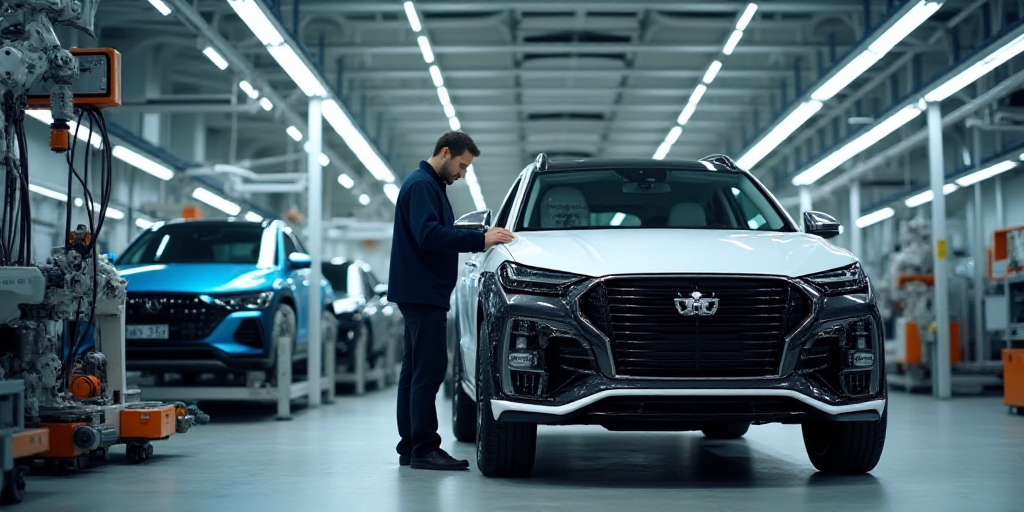Background on the Mexican Automotive Industry and Key Players
The Mexican automotive industry, a significant contributor to the country’s economy, has been facing challenges due to tariffs imposed by the United States on Mexican vehicles. Key players in this sector include General Motors, Volkswagen, Mazda, Nissan, KIA, Toyota, BMW, and Mercedes Benz. These companies have been navigating the uncertain landscape surrounding the review of the T-MEC (United States-Mexico-Canada Agreement) and adjusting to changes in the U.S. market, particularly regarding electrification.
September Production and Export Data
According to the National Institute of Statistics and Geography (Inegi), Mexico’s light vehicle production dropped by 6.1% in September 2025 compared to the same month in 2024, totaling 355,525 units. This decline is the first for a September since 2021 and was influenced by tariffs on Mexican vehicles in the U.S. market.
Exports of light vehicles also experienced a slight decrease of 0.3% in September 2025, reaching 314,656 units compared to 315,980 in September 2024. Despite this reduction, September 2025 marked the second-highest production level in history for the month.
Impact on Major Automakers
General Motors and Volkswagen faced substantial production cuts of 16.9% and 17.7%, respectively, while Mazda experienced an 11.5% decrease in output during September. Both General Motors and Volkswagen have resorted to labor strikes due to reduced sales in the U.S. market caused by tariffs.
The production of hybrid and electric vehicles by General Motors, Ford, Stellantis, and Toyota fell 5.6% in September 2025, assembling only 15,971 units—marking their second consecutive month of decline.
On the other hand, Nissan, KIA, Toyota, BMW, and Mercedes Benz increased their production in September by diversifying markets, such as Europe. This helped offset the overall decrease in production and exports.
Export Performance by Brand
Mazda suffered the most significant export decline of 46.4%, followed by BMW with a 34.6% decrease and Honda with a 21.4% reduction in September.
Year-to-Date Production and Export Trends
From January to September 2025, Mexico produced a total of 3,021,554 light vehicles, representing a slight decrease of 0.3% compared to the same period in 2024. This is the second-best historical record for the first nine months of the year.
Mexican-made vehicles accounted for 20% of the U.S. auto market in recent months, up from an average of 17%. Over the same period, more than 2.5 million units were exported, with a 0.9% decrease compared to 2024—demonstrating stable performance amidst international conditions.
T-MEC Review and Industry Collaboration
The Automotive Industry Association of Mexico (AMIA) president, Rogelio Garza, recently stated that the environment for T-MEC review has become complicated due to potential stricter rules of origin in auto manufacturing. Currently, 75% of auto content originates from North America, but Chinese components are often excluded.
The AMIA continues to collaborate with the federal government and counterparts in the U.S. and Canada to advance the Mexican automotive industry and share relevant performance information.
Key Questions and Answers
- What are the tariffs affecting? Tariffs imposed by the United States on Mexican vehicles are impacting both domestic production and exports.
- Which companies were most affected by the tariffs? General Motors, Volkswagen, and Mazda experienced significant production cuts due to reduced sales in the U.S. market.
- How did exports fare in September 2025? Although there was a slight decrease of 0.3% in light vehicle exports, September 2025 still marked the second-highest production level in history for that month.
- What is the current status of T-MEC review? The review process for T-MEC has become complicated due to potential stricter rules of origin in auto manufacturing, with Chinese components often excluded.






